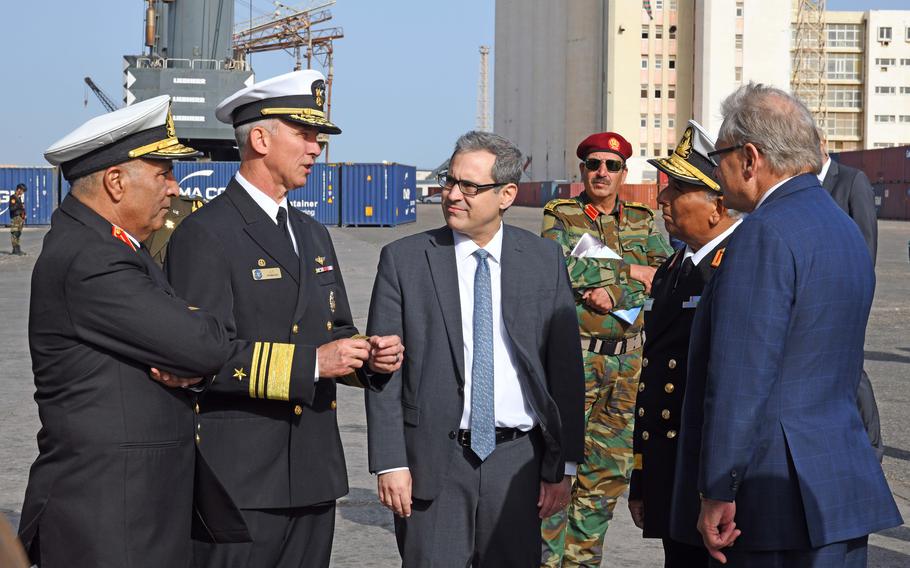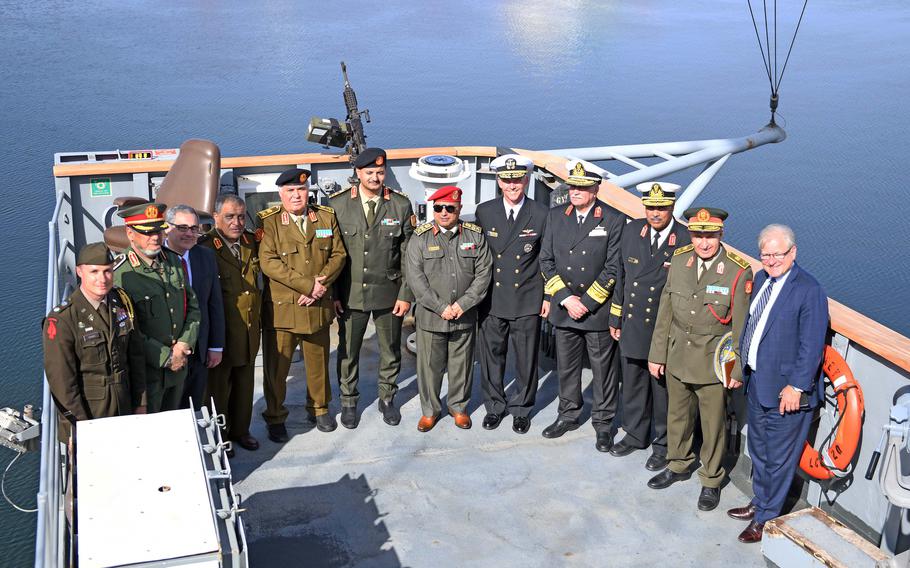
U.S. 6th Fleet commander Vice Adm. J.T. Anderson, second from left; Charge d’Affaires Jeremy Berndt, middle; and Ambassador Richard Norland, far right, greet key Libyan military and civilian officials before a reception aboard the USS Mount Whitney during a port visit in Tripoli, Libya, April 20, 2025. That visit and another to Benghazi marked the Navy’s first Libyan port calls in more than five decades. (Mario Coto/U.S. Navy)
NAPLES, Italy — The Navy’s first port calls to Libya in more than five decades this week likely are intended to send a clear message to Russia and China about U.S. resolve across the Mediterranean region, analysts say.
Visits to Tripoli and Benghazi on Sunday and Monday, respectively, were the first for the Navy in 56 years and included the amphibious command ship USS Mount Whitney and Vice Adm. Jeffrey Anderson, commander of U.S. 6th Fleet, the Navy said in a statement Monday.
The presence of the 6th Fleet flagship and the service’s second-highest-ranking officer in Europe and Africa is a notable message to competitors that the United States remains interested and involved in North Africa, said Bradley Martin, a retired Navy surface warfare officer and director of the Rand Corp. National Security Supply Chain Institute.
“It’s a signal to the world that we are there, we are not walking away from it,” Martin said. “And that we have an ability to form relationships even in places like Libya where previously (relations have) been very troubled.”
With an extensive coastline along the Mediterranean Sea — considered the gateway to Europe, Africa and the Middle East — Libya is important in strategic American competition with China and Russia, Martin and other analysts point out.
With Russian access to a key seaport in Syria greatly reduced, the Kremlin is eyeing Libya among contender sites for basing its maritime operations in the Mediterranean and North Africa, Martin said.
China increasingly is sending military ships into the region, and both private and state-owned Chinese shipping companies are buying stakes in, developing and operating Mediterranean ports, including two near the Suez Canal, according to a 2023 Middle East Institute report.
Control of Libya is being contested by two opposing factions, an internationally recognized government in Tripoli and the Libyan National Army, which dominates much of the eastern part of the country and is backed by Russia.
This week’s Navy visits included meetings with officials “to discuss enhancing U.S.-Libya military cooperation and U.S. support for Libyan efforts to reunify the country’s military forces,” according to the Navy statement.

U.S. and Libyan military and civilian officials pose for a photo aboard USS Mount Whitney during a port visit in Benghazi, April 21, 2025. It was the first port call to Libya by a U.S. Navy ship in more than five decades. (Mario Coto/U.S. Navy)
Engagement with Libya is prudent as the U.S. works to stabilize the area and make it safe for trade and power projection, said Sebastian Bruns, a German maritime security expert and senior researcher for the Institute for Security Policy at Kiel University.
“One of the great assets of the U.S. always has been the ability to build alliances,” Bruns said.
He added that those efforts often must take place despite differing philosophies when it comes to freedom of speech and the press and other core elements of democracy.
The U.S.-Libya relationship has been turbulent in the wake of war, terrorism and sanctions following the rule of longtime strongman Moammar Gadhafi, who met a violent death in 2011.
That year, Mount Whitney played a role in Operation Odyssey Dawn in Libya, the international response to a brutal crackdown on Arab Spring protests by Gadhafi.
A year later, Islamic terrorists attacked two U.S. facilities in Benghazi, killing four Americans, including the U.S. ambassador to Libya. Today, the U.S. diplomatic mission to Libya operates in Tunis, Tunisia, according to the State Department.
The Navy interactions in Tripoli and Benghazi this week are evidence of continued U.S. investment in a peaceful and unified Libya, Anderson said in the release.
Mount Whitney also made a port call in Tunisia on Thursday.